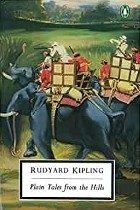 Rudyard Kipling •
Rudyard Kipling •
Plain Tales from the Hills •
Prepare to be enchanted.
Kipling gets a bad rap these days because of his ties to British colonial rule, but make no mistake: He is a storyteller’s storyteller and a poet’s poet. Here’s a wager for you: Read the first three vignettes and see if you can stop. I’m betting you can’t.
In gossipy, confiding tones, Kipling shows us the human face of India under the Raj. “Cupid’s Arrows” depicts a love affair gone hilariously awry: “Barr-Saggott looked as if the last few arrow-heads had been driven into his legs instead of the target’s.” In “Haunted Subalterns” we cross paths with a banjo-playing ghost (“Haven’t you . . . committed some murder that has slipped your memory?”).
Each of these 42 ultrashort stories is filled with sharply drawn characters, rich sensual detail, and pithy (if cynical) observations: “Speaking to or crying over a husband never did any good yet.” “Men often do their best work blind.”
Kipling uses the down-to-earth vernacular of his day, yet it dazzles just the same. Plain Tales hums with all the allure and vibrancy, spice and exoticism that we in the West have come to associate with India—largely because Kipling himself fostered that vision of the subcontinent in the public imagination.
Every page bears witness to his deep-seated, infectious love for the land of his birth, and his fascination with all of southern Asia. Only listen to the soul-stirring rhythms of “Mandalay” (Collected Poems) to be seized by an indescribable longing:
Ship me somewheres east of Suez
Where the best is like the worst
Where there aren’t no Ten Commandments
An’ a man can raise a thirst
For the temple-bells are callin’
An’ it’s there that I would be
By the old Moulmein Pagoda
Looking lazy at the sea . . .





Your email address will not be published.